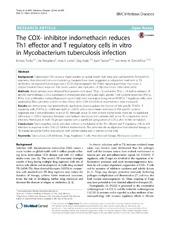| dc.contributor.author | Tonby, Kristian | en_US |
| dc.contributor.author | Wergeland, Ida | en_US |
| dc.contributor.author | Lieske, Nora Valeska | en_US |
| dc.contributor.author | Kvale, Dag | en_US |
| dc.contributor.author | Tasken, Kjetil | en_US |
| dc.contributor.author | Dyrhol-Riise, Anne Ma | en_US |
| dc.date.accessioned | 2017-06-07T07:24:01Z | |
| dc.date.available | 2017-06-07T07:24:01Z | |
| dc.date.issued | 2016-10-24 | |
| dc.identifier.issn | 1471-2334 | |
| dc.identifier.uri | https://hdl.handle.net/1956/15931 | |
| dc.description.abstract | Background: Tuberculosis (TB) causes a major burden on global health with long and cumbersome TB treatment regimens. Host-directed immune modulating therapies have been suggested as adjunctive treatment to TB antibiotics. Upregulated cyclooxygenase-2 (COX-2)-prostaglandin E2 (PGE2) signaling pathway may cause a dysfunctional immune response that favors survival and replication of Mycobacterium tuberculosis (Mtb). Methods: Blood samples were obtained from patients with latent TB (n = 9) and active TB (n = 33) before initiation of anti-TB chemotherapy. COX-2 expression in monocytes and ESAT-6 and Ag85 specific T cell cytokine responses (TNF-α, IFN-γ, IL-2), proliferation (carboxyfluorescein succinimidyl ester staining) and regulation (FOXP3+ T regulatory cells) were analysed by flow cytometry and the in vitro effects of the COX-1/2 inhibitor indomethacin were measured. Results: We demonstrate that indomethacin significantly down-regulates the fraction of Mtb specific FOXP3+ T regulatory cells (ESAT-6; p = 0.004 and Ag85; p < 0.001) with a concomitant reduction of Mtb specific cytokine responses and T cell proliferation in active TB. Although active TB tend to have higher levels, there are no significant differences in COX-2 expression between unstimulated monocytes from patients with active TB compared to latent infection. Monocytes in both TB groups respond with a significant upregulation of COX-2 after in vitro stimulation. Conclusions: Taken together, our in vitro data indicate a modulation of the Th1 effector and T regulatory cells in Mtb infection in response to the COX-1/2 inhibitor indomethacin. The potential role as adjunctive host-directed therapy in TB disease should be further evaluated in both animal studies and in human clinical trials. | en_US |
| dc.language.iso | eng | eng |
| dc.publisher | BioMed Central | eng |
| dc.relation.ispartof | <a href="http://hdl.handle.net/1956/15932" target="_blank">Immune cells and soluble immune markers in different stages of tuberculosis. Potential biomarkers for diagnosis and treatment efficacy</a> | |
| dc.rights | Attribution CC BY | eng |
| dc.rights.uri | http://creativecommons.org/licenses/by/4.0 | eng |
| dc.subject | Tuberculosis | eng |
| dc.subject | COX-inhibitors | eng |
| dc.subject | Tregs | eng |
| dc.subject | Regulatory T cells | eng |
| dc.subject | Host-directed therapy | eng |
| dc.subject | Monocytes | eng |
| dc.subject | Cytokines | eng |
| dc.title | The COX- inhibitor indomethacin reduces Th1 effector and T regulatory cells in vitro in Mycobacterium tuberculosis infection | en_US |
| dc.type | Peer reviewed | |
| dc.type | Journal article | |
| dc.description.version | publishedVersion | en_US |
| dc.rights.holder | Copyright 2016 The Author(s) | |
| dc.source.articlenumber | 599 | |
| dc.identifier.doi | https://doi.org/10.1186/s12879-016-1938-8 | |
| dc.identifier.cristin | 1403105 | |
| dc.source.journal | BMC Infectious Diseases | |
| dc.source.40 | 16 | |

